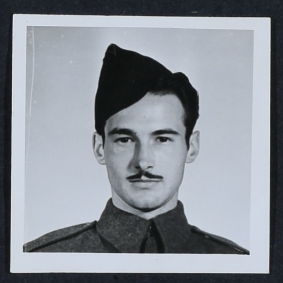Romeo Sabourin, intelligence officer, SOE operative (born 31 December 1922 in Montreal, QC; died 14 September 1944 in Buchenwald, Germany). Romeo Sabourin was a Canadian military officer in the Second World War who became a member of the Special Operations Executive (SOE) and deployed to occupied France. Sabourin was one of several operatives who were captured and eventually executed by the German military.

Early Life and Enlistment
Romeo Sabourin was born in Montreal to Eugene and Flore Sabourin in December 1922. He was functionally bilingual in both French and English. He left school at the age of 13 and eventually found work as a machine operator at a shoe manufacturer in Montreal. In the spring of 1940, Sabourin enlisted in the Les Fusiliers Mont-Royal as an infantry soldier; he was 17 years old at the time but listed his age as 19. His mother wrote to the department of national defence a year later notifying them of the issue; by that point, however, he was 18 and already overseas and the army was not obliged to send him home (soldiers would only be returned if they were proven to be younger than 17).
Overseas Service
Romeo Sabourin was first sent to Iceland for three months with his unit, where it joined the Canadian garrison there. He was then sent to the United Kingdom (UK). During his time in the UK, he was injured in a serious car accident and was absent without leave (AWOL) several times. On one occasion, he was absent for a total of 35 days and listed as a deserter. Sabourin was apprehended and sentenced by a court martial to a detention barracks for four six months, but was granted 49 days remission of his sentence for good behaviour. Upon release from detention in April 1942 he was trained as a wireless operator and employed as a signaller. A report dated 17 April 1942 noted that his “detention has made a smart soldier of him. Claims he wants to settle down and do some useful work. Likeable personality.” In the summer of 1943, he was employed at the headquarters of the 6th Infantry Brigade.
Recruitment by the Special Operations Executive
In August 1943, Romeo Sabourin was transferred to the Special Operations Executive. The SOE was a secret British organization that helped resistance movements and conducted sabotage and espionage in territory occupied by Germany. As a trained signaller fluent in French and English, Sabourin would have been an asset to the SOE. Wireless operators were needed to transmit messages back from the European mainland and his language skills would help him easily integrate into France. Sabourin spent the fall of 1943 and early 1944 training with the SOE in England. In November 1943, he was granted a commission and promoted to lieutenant as a member of the Canadian Intelligence Corps. He was given the cover name Guy Robert Desjardins and the code names Leonard and Sorcerer. His radio callsign was Pullover.
Deployment to France and Capture
In early 1944, Romeo Sabourin completed his training and was ready to be deployed to France as wireless operator for a team of operatives around Verdun. On 2 March 1944, Sabourin and another SOE operative were dropped into occupied France by parachute. Unknown to him and SOE headquarters, the network had already been captured by the German Gestapo. Code books had been captured along with the operatives, which allowed the Gestapo to send fake messages to England and encourage the deployment of further SOE members.
Sabourin and his colleague were captured shortly after landing in France. In the eyes of the German authorities they were spies and not prisoners of war. Sabourin and other captured SOE operatives were held at a Gestapo prison in Paris where they were interrogated. Another Allied agent reported seeing Sabourin and others at the prison in June 1944, confirming to SOE staff that they had been captured.
In late summer 1944, the prison was evacuated as the Allied armies neared Paris. By late August, they prisoners arrived at the Buchenwald concentration camp in Germany. On 14 September, Sabourin was executed by hanging alongside 38 other SOE operatives at the Buchenwald camp. Official word of their death was not received until spring of 1945 when surviving prisoners were released from the camp by the advancing Allied armies. Sabourin and several other SOE operatives are commemorated on the Grosbeek Memorial in the Netherlands.
For his service, Sabourin was awarded the 1939-45 Star, France and Germany Star, Defence Medal, Canadian Volunteer Service Medal with Clasp and War Medal 1939-45, some of which were posthumous.

 Share on Facebook
Share on Facebook Share on X
Share on X Share by Email
Share by Email Share on Google Classroom
Share on Google Classroom




